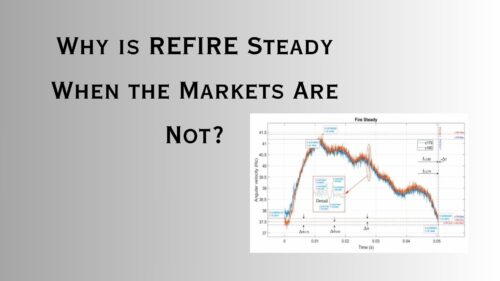“The sky is falling!”
–Chicken Little
Today, March 9, 2020, was a bloodbath of fairly epic proportions for the stock market.
- The Dow dropped 7.79%.
- The NASDAQ dropped 7.29%.
- The S&P 500 dropped 7.60%.
- The NYSE composite index dropped 8.53%.
Today’s performance dropped the Vanguard S&P 500 Index ETF (VOO) into negative territory for 2020. Of course, there’s a 1.87% dividend yield, so the quarterly dividends are right around the corner.
However, let’s forget about that pesky little total return including dividends for a minute, since the headlines are screaming that the sky is falling and that we’ll be in a coronavirus-led recession, nay, depression. After all, since Covid-19 was named, stocks have dropped faster than since the 1933 Great Depression.
Fear-driven headlines draw eyeballs, which sells advertising, which makes the fear-mongers lots of money.
After all, we’ve seen how the media wants you to panic about retirement. Why wouldn’t they want you to panic about Covid-19? Or a Saudi Arabian-Russian oil spat. Or or or?
We retired at the end of 2019, so we retired into the teeth of this little stock market roller coaster.
Yet, meh.
According to Mint, as of the close of the market today, our net worth is 98.2% of what it was at the beginning of 2020. My take home pay for boards is 20% of what we spend monthly. So, we’re not making income from my board work to cover our expenses.
We have to live off of our portfolio.
How are we doing it?
We REFIREd.
I’m going to come up with a retire early acronym until one sticks!
I even tried one of my own: PIRE
What is REFIRE?
Real
Estate
Financial
Independence
Retire
Early
64.8% of our net worth (not including our private investments, which are not in the money, so I value them at $0) comes from real estate. That doesn’t include the property we have under contract to close by the end of the month (we’d have closed by now already if it were up to me, but a bank is on the other side of the transaction, slowing things down) that, after we rehab it, we’ll be buying for about 65% of its market value. That’ll skew our numbers slightly higher.
As I outlined in “Getting People Who Live in Houses to Pay You,” we are very formulaic about how we approach our real estate investing.
This is how we’re covering the bills: we have renters who cover our income (and the upkeep and appurtenant expenses of the rental properties).
So, while stock markets dropped about 8% today, our rental income stream didn’t change one iota.
Why is REFIRE Steady When the Markets Are Not?

There are several reasons why, in the short-to-medium term (and perhaps the long term), a downward trend in the markets doesn’t particularly cause us to lose sleep at night.
- Leases have set rent amounts, so, barring abandonment, set incomes. We lease our properties out for at least a year. We’ll even give a little discount to renters if they’ll sign a 2-year lease. There’s significant value in reducing the variance of our income while we’re retired since we know what our budget is. Variance is great when you’re accumulating, as it allows you to try to buy low and sell high. But, if you’re planning on spending $5,000 and counting on $5,000 of income, you don’t want that number to fluctuate.
- Real estate may drop (hello 2008), but it won’t have a wild roller coaster like stock markets. Our properties are worth roughly the same today as they were yesterday. They’re much more illiquid, meaning there’s not a ready market of buyers and sellers for properties as there are for, say, the VOO ETF.
- Being a cash buyer gives us leverage, particularly if the housing market does stumble. We only buy when the blue light is flashing (and I don’t mean the police). Because we buy at such a discount, such as what I described above, we have a lot of room for error. Usually, the only types of sellers who are nibbling at our bait are ones who are in some sort of distress and need to move quickly. We offer that certainty.
- We invest in the lower end of the real estate market. We’re investing in properties that tend to have high demand: 3-5 bedroom, 2-3 bathroom properties in good school districts. The properties are priced such that lots of people can afford the rent (we’re at about 23% of the 2018 median household U.S. income). Our renters are typically in jobs that, if you believe Daniel Susskind in A World Without Work, are not going to be taken over by AI and automation any time soon.
- Real estate market crashes tend to hit the middle-class markets. As the National Bureau of Economic Research pointed out, the 2008 housing crash disproportionately affected the middle class. While I can’t guarantee that the future will look like the past, the area where we invest was disproportionately unaffected by the housing crash. So, we avoid the volatile markets where we can, except when we’re being aggressive in our investing.
Yes, I may be approaching this in a slightly pollyannaish view. After all, if the markets go up by 30%, our rental income won’t go up that much. It’ll come much closer to matching inflation. As we examined in “Getting People Who Live in Houses to Pay You,” we have to create our capital gains on the purchase and the rehab more than anything else. A Great Depression with thirtysomething percent structural unemployment and wildly depressed incomes will hit everyone. Someone who REFIREs won’t be immune.
Still, homelessness in the Great Depression was about 1.6% (2 million homeless of 124.8 million residents in the U.S. in 1932). Granted, the current homelessness rate is 0.2%, so there’s plenty of room to reach Great Depression levels of homelessness. That might disproportionately hit our real estate portfolio, although more than 2/3 of homelessness occurs in urban areas.
Therefore, someone who REFIREs with limited debt (or, in our case, no debt) should have a more resilient portfolio to negative stock market shocks (a la the massive drop of March 9, 2020) because of the nature of housing. The downside is that the upside is limited. Our portfolio won’t ever see a 30% gain in one year for the same reasons, but we never planned on it having massive capital appreciation. Someone who REFIREs is converting wealth into income to pay for their retirement years, hopefully many more than the average American has.
Has the rollercoaster rattled you? Do you have a real estate portfolio to act as your antacid tonight? Let’s talk about it in the comments below!
Author Profile
- John Davis is a nationally recognized expert on credit reporting, credit scoring, and identity theft. He has written four books about his expertise in the field and has been featured extensively in numerous media outlets such as The Wall Street Journal, The Washington Post, CNN, CBS News, CNBC, Fox Business, and many more. With over 20 years of experience helping consumers understand their credit and identity protection rights, John is passionate about empowering people to take control of their finances. He works with financial institutions to develop consumer-friendly policies that promote financial literacy and responsible borrowing habits.
Latest entries
 Low Income GrantsSeptember 25, 2023How to Get a Free Government Phone: A Step-by-Step Guide
Low Income GrantsSeptember 25, 2023How to Get a Free Government Phone: A Step-by-Step Guide Low Income GrantsSeptember 25, 2023Dental Charities That Help With Dental Costs
Low Income GrantsSeptember 25, 2023Dental Charities That Help With Dental Costs Low Income GrantsSeptember 25, 2023Low-Cost Hearing Aids for Seniors: A Comprehensive Guide
Low Income GrantsSeptember 25, 2023Low-Cost Hearing Aids for Seniors: A Comprehensive Guide Low Income GrantsSeptember 25, 2023Second Chance Apartments that Accept Evictions: A Comprehensive Guide
Low Income GrantsSeptember 25, 2023Second Chance Apartments that Accept Evictions: A Comprehensive Guide

